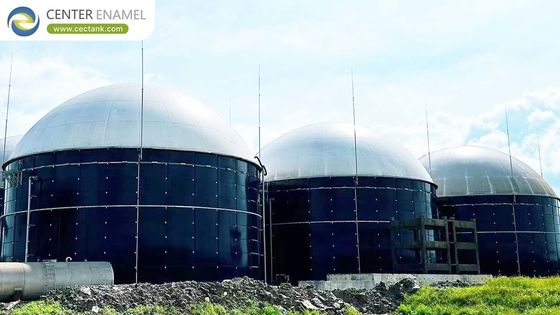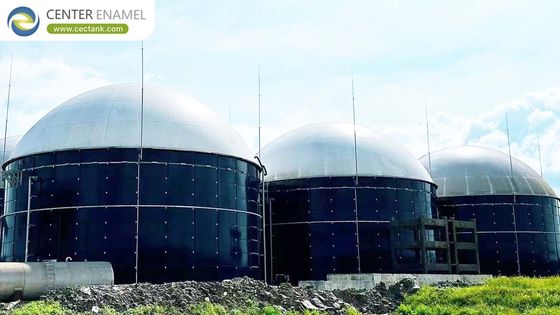-
Glass Fused To Steel Tanks (419)
-
Stainless Steel Tanks (410)
-
Fusion Bonded Epoxy Tanks (424)
-
Galvanized Steel Tanks (321)
-
Aluminum Dome Roofs (872)
-
Wastewater Storage Tanks (226)
-
Welded Steel Tanks (297)
-
Pressure Vessels (295)
-
Anaerobic Digester (201)
-
Industrial Water Tanks (349)
-
Glass Lined Steel Tanks (180)
-
Bolted Steel Tanks (181)
-
Sludge Storage Tank (115)
-
Biogas Storage Tank (173)
-
Leachate Storage Tanks (133)
-
Agricultural Water Storage Tanks (179)
-
Fire Water Tank (166)
-
Grain Storage Silos (130)
-
Biogas Projects (349)
-
Wastewater Treatment Projects (270)
-
Double Membrane Roof (223)
Glass-Lined Steel Biogas Storage Tanks: Revolutionizing Biogas Anaerobic Digestion
| Place of Origin: | China |
| Brand Name: | CEC TANKS |
| Certification: | ISO 9001:2008, AWWA D103 , OSHA , BSCI |
| Model Number: | J2016012620 |
| Minimum Order Quantity: | 1set |
| Price: | $5000~$20000 one set |
| Packaging Details: | PE poly-foam between each two steel plates ; wooden pallet and wooden box |
| Delivery Time: | 0-60 days after deposit received |
| Payment Terms: | L/C, T/T |
| Supply Ability: | 60 sets per month |
|
Detail Information |
|||
Product Description
In the search for sustainable energy solutions and effective waste management, Glass-Lined Steel Biogas Storage Tanks have emerged as a game-changer. These tanks, engineered to meet the rigorous demands of biogas storage in anaerobic digestion systems, offer a highly efficient and durable solution for industries involved in wastewater treatment, agriculture, and waste-to-energy projects. As the world continues to prioritize renewable energy sources and sustainable practices, Shijiazhuang Zhengzhong Technology Co., Ltd (Center Enamel) provides state-of-the-art biogas storage tanks that are essential for maximizing energy production from organic waste.
Understanding Biogas Anaerobic Digestion
Anaerobic digestion (AD) is a natural process where microorganisms break down organic materials—such as food waste, sewage, agricultural residues, and industrial byproducts—in the absence of oxygen. This process generates biogas, a mixture primarily composed of methane (CH₄) and carbon dioxide (CO₂), which can be harnessed as a renewable energy source. The biogas produced can be used to generate electricity, heat, and even fuel for vehicles, making it a crucial component in the transition to a low-carbon, circular economy.
As a leading storage tank manufacturer in China. At Shijiazhuang Zhengzhong Technology Co., Ltd., we excel in providing high-quality bolted steel tanks tailored for the diverse needs of fish farming. Our extensive range of bolted steel tanks includes Glass-Fused-to-Steel (GFS) tanks, fusion bonded epoxy tanks, stainless steel tanks, and galvanized steel tanks, each designed to offer exceptional durability, efficiency, and adaptability for aquaculture applications.
| Configuration of Customized Storage Tanks | ||||
| Storage tanks | Volume | Roofs | Application | Design Requirements |
|
GFS Tanks SS Tanks Fusion Bonded Epoxy Tanks Galvanized Steel Tanks Welded Steel Tanks |
<1000m³ 1000-10000m³ 10000-20000m³ 20000-25000m³ >25000m³ |
ADR Roof GFS Roof Membrane Roof FRP Roof Trough Deck Roof |
Wastewater Treatment Project Drinking Water Project Municipal Sewage Project Biogas Project Fire Water Storage Project Oil Storage Project |
Water Supply & Drainage System Seismic Design Wind Resistant Design Lightning Protection Design Tank Insulation Design |
WasteWater Treatment Project Equipment Supply
| Pretreatment Equipment | Resource Utilization System | Sludge Treatment System | Other Equipment |
|
Mechanical Bar Screen Solid-liquid Separator Submersible Mixer |
Gas Holder Boiler System Boost Fan Biogas Generator Torch System Dehydration and Desulfurization Tank |
PAM Integration Dosing Device Screw Sludge Dewatering Machine Slurry Separation Centrifuge |
Sewage Pump Mud Scraper Submersible Sewage Pump Three-phases Separator |
In the context of wastewater treatment and industrial waste management, anaerobic digestion is increasingly seen as an efficient way to reduce organic waste volume, treat sewage, and recover valuable resources, including biogas.
The Role of Glass-Lined Steel Biogas Storage Tanks
To effectively capture and store biogas produced during anaerobic digestion, biogas storage tanks are essential. The high-pressure and fluctuating gas production during digestion processes make these tanks a critical component in ensuring a reliable and continuous supply of biogas. Center Enamel's Glass-Lined Steel Biogas Storage Tanks are specifically designed for this purpose, offering a combination of durability, gas-tightness, and corrosion resistance that enhances biogas production efficiency.
These tanks are constructed using Glass-Fused-to-Steel (GFS) technology, where steel is coated with a layer of vitreous glass, providing an airtight, durable, and non-corrosive surface. This ensures that biogas is safely stored, and no energy is lost through leaks or deterioration of the tank material. GFS tanks are well-suited to handle the volatile nature of biogas, offering both long-term performance and safety.
Key Features of Glass-Lined Steel Biogas Storage Tanks
Corrosion Resistance: Biogas contains harmful components such as hydrogen sulfide (H₂S), which can lead to severe corrosion in traditional steel tanks. The Glass-Lined Steel construction prevents corrosion, even under harsh conditions, thus extending the lifespan of the tank and maintaining its integrity.
Gas Tightness: The glass-enamel coating provides a superior seal that ensures the tank remains airtight. This is essential for preventing the loss of biogas and ensuring a steady supply of energy. The tanks are designed with high-quality sealing systems that provide additional leak protection.
Durability and Longevity: The GFS material is not only resistant to corrosion but also to physical wear, making the tanks ideal for long-term operation. The strong and durable nature of the tank ensures that it can withstand the stresses of fluctuating pressure and temperature during the anaerobic digestion process.
High Capacity: These tanks are designed to handle large volumes of biogas, making them suitable for large-scale wastewater treatment plants, agricultural operations, and industrial applications. The high capacity ensures that biogas can be stored in adequate amounts for consistent energy production.
Environmental Safety: With GFS tanks, biogas storage complies with environmental safety standards, as the tanks are free from harmful chemicals. The materials used in the construction are non-toxic and contribute to reducing the carbon footprint of the facility.
Modular and Scalable: The modular design of our tanks allows for flexible sizing and scalability. Whether your biogas storage needs are small or large, the tanks can be customized to fit specific project requirements, and additional units can be added as the needs grow.
Low Maintenance: The glass-lined steel material minimizes the accumulation of waste and makes maintenance easier. Its smooth surface prevents dirt and sediment build-up, reducing the frequency of cleaning and ensuring efficient biogas storage.
Applications of Glass-Lined Steel Biogas Storage Tanks
Wastewater Treatment Plants: Municipal and industrial wastewater treatment plants are major users of biogas storage tanks. In these plants, biogas is produced during the treatment of organic matter in sewage, and it can be stored for use in generating electricity or heating.
Agricultural Waste Management: Farms generating organic waste, such as animal manure, crop residues, and food waste, can use anaerobic digestion systems to produce biogas. The Glass-Lined Steel Biogas Storage Tanks store the produced biogas, allowing farmers to use it for energy, such as heating, electricity generation, or even as a vehicle fuel substitute.
Waste-to-Energy Projects: Industrial facilities involved in waste-to-energy projects can harness the biogas produced from organic waste using anaerobic digesters. The biogas storage tanks ensure that the biogas can be safely captured, stored, and used efficiently for energy production, helping industries reduce waste and become more energy independent.
Landfill Gas Management: Landfills are a significant source of methane emissions. Anaerobic digestion technology can be integrated into landfill gas management systems, where Glass-Lined Steel Biogas Storage Tanks capture and store biogas to be used as a renewable energy source.
Food Processing: Food and beverage industries generate significant organic waste during production. By implementing anaerobic digestion systems, these facilities can turn food waste into biogas, which can be used as a clean, renewable energy source to power operations.
Installation of Glass-Lined Steel Biogas Storage Tanks
Proper installation of biogas storage tanks is crucial to ensuring their efficient operation. Here is an overview of the installation process:
Site Selection: Choose a location with adequate space, proper drainage, and easy access for maintenance. The site should be level and stable to prevent structural issues with the tank.
Foundation Preparation: A strong, stable foundation (often concrete) is required to support the weight and stress of the tank. The foundation should be level and capable of bearing the weight of the full tank when it is in operation.
Tank Assembly: The tank is assembled on-site from bolted Glass-Fused-to-Steel panels, ensuring structural integrity. Proper care is taken during assembly to avoid damage to the enamel coating.
Pipeline Connection: After the tank is securely installed, pipelines are connected to the biogas production system (anaerobic digester) and other equipment. Leak-proof seals are crucial for ensuring biogas is stored without loss.
Safety Inspection: After installation, thorough testing is performed to ensure that the tank is operating safely and effectively. This includes leak testing, pressure testing, and inspections to verify structural integrity.
Ongoing Maintenance: Regular inspections, cleaning, and monitoring of the tank’s condition are necessary to ensure optimal performance and longevity.
Benefits of Glass-Lined Steel Biogas Storage Tanks
Maximizes Energy Recovery: By securely storing biogas, these tanks allow for efficient energy recovery, reducing reliance on non-renewable energy sources and lowering operational costs.
Enhances Environmental Performance: By converting waste into energy and reducing greenhouse gas emissions, these tanks contribute to a more sustainable and eco-friendly operation.
Reduces Maintenance Costs: The corrosion-resistant properties of Glass-Lined Steel minimize the need for frequent repairs, leading to lower maintenance costs and fewer operational interruptions.
Glass-Lined Steel Biogas Storage Tanks are indispensable for any industry looking to harness the power of anaerobic digestion. Whether in wastewater treatment, agricultural waste management, or industrial biogas production, these tanks offer a durable, efficient, and safe solution for biogas storage. At Shijiazhuang Zhengzhong Technology Co., Ltd (Center Enamel), our high-quality GFS tanks ensure reliable biogas storage, supporting sustainable energy production and waste management practices. With their outstanding durability, gas-tightness, and corrosion resistance, our biogas storage tanks provide long-term value, making them the ideal choice for a cleaner, greener future.
For more information on our Glass-Lined Steel Biogas Storage Tanks or to discuss your project requirements, contact us today. Our expert team is ready to assist with design, installation, and ongoing support.




